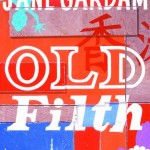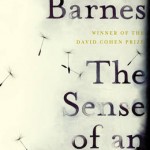This post is seven years too late.
A perverse and quite irrational sense of anti-nepotism, for want of a better term, has prevented me from becoming acquainted with Jane Gardam‘s beautiful writing before this year. We are not related (sadly!); even if we were, since Gardam is Jane’s husband’s surname, I couldn’t even claim shared genetic matter. Strange, I know, but I’ve never wanted to be seen reading someone with whom I have no other connection apart from sharing a surname.
What ridiculous vanity.
Fortunately my mother-in-law picked up Gardam’s Old Filth at a second-hand book sale recently, and passed it on. I’d read Gardam’s A Few Fair Days, a young adult novel, last year, and loved it, so was more than ready to chuck out my irrational prejudices.
Old Filth was shortlisted for the Orange Prize in 2005. It should have won the Booker.

Which brings us to Julian Barnes, and a comparison I am about to make that will pain my inner 20-year-old.
I discovered Barnes’s Staring At The Sun when I was an impressionable, and energetic, reader, gobbled it down – it made me gulp with understanding – and proceeded to consume all he’d written for most of my twenties. Julian Barnes followed my years spent as a teenage existentialist (Camus, Sartre, Dostoyevsky, Nietsche, Kierkegaard, the whole undergraduate bookshelf) neatly, and I read him obsessively right up until he published The Porcupine, at which point I fell out of love. (Growing up as a reader is a whole essay in itself, isn’t it?)
I rediscovered Barnes via a second-hand bookstore, of course, and a copy of The Lemon Table. Delight. (I will keep those stories forever, for I know I will enjoy re-reading them much later.) Discovered that Pulse was about to be published, and devoured that, too. Joy.
Then, in an arguably limpid field, The Sense of an Ending was nominated for, and then won, the Booker Prize. And no, it’s not his greatest work, not my favourite, but still an exercise in master craftsmanship of a tight tale.

Where were we? Oh yes, Jane Gardam. So I came to Gardam’s novel Old Filth post-Barnes, and I’m positive someone else MUST have made this connection but I’m too lazy to google-research it: Old Filth is similar to The Sense of an Ending, but it’s superior. The themes of reconstructing one’s life in memory from the vantage point of dotage are virtually parallel. But she does it better.
I’m glad that Barnes won a Booker, but to be fair, Gardam should have, too, seven years earlier.

